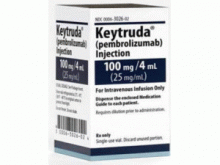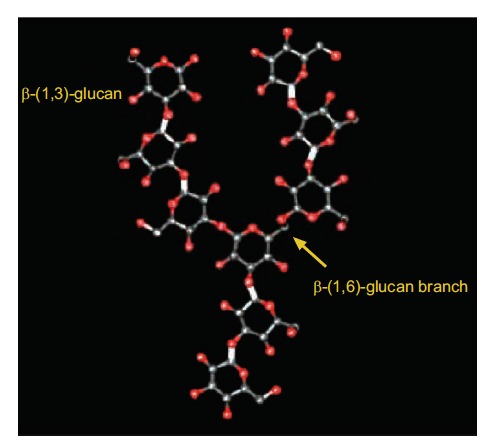派姆单抗注射溶液Keytruda vial 25mg/ml 4ml说明书
 药店国别:
产地国家:美国
处方药:是
所属类别: 25毫克/毫升 4毫升/瓶
包装规格: 25毫克/毫升 4毫升/瓶
计价单位:瓶
生产厂家中文参考译名:
生产厂家英文名:MERCK SHARP & DOHME CORP
原产地英文商品名:KEYTRUDA 25MG/ML 4ML SDV 1/EA
原产地英文药品名:PEMBROLIZUMAB
中文参考商品译名:KEYTRUDA注射溶液 25毫克/毫升 4毫升/瓶
中文参考药品译名:派姆单抗
曾用名:
简介: 近日,FDA加速批准Keytruda(pembrolizumab)用于治疗PD-L1阳性的复发性局部晚期或转移性的胃癌/胃食管结合部腺癌患者。这是胃癌多年来难得获批的治疗新药。本次获批的胃癌患者主要还是传统治疗后难以控制的患者,患者要求必须在至少接受2次系统性治疗后(包括含有氟尿嘧啶类和铂类的化疗,同时如果合适的HER2为靶点的靶向治疗例如曲妥珠单抗等)仍出现疾病进展的情况使用。为晚期难治性患者开创了新的治疗途径。批准日期:2017年9月23日;公司:默沙东KEYTRUDA(派姆单抗 pembrolizumab)注射液,用于静脉内使用KEYTRUDA(派姆单抗 pembrolizumab)注射液,用于静脉注射美国最初批准:2014年最近的重大变化适应症和用法:08/2018剂量和用法:08/2018警告和注意事项:08/2018
作用机制
PD-1配体PD-L1和PD-L2与T细胞上发现的PD-1受体的结合抑制T细胞增殖和细胞因子产生。 在一些肿瘤中发生PD-1配体的上调,并且通过该途径的信号传导可以有助于抑制肿瘤的活性T细胞免疫监视。Pembrolizumab是一种单克隆抗体,可与PD-1受体结合并阻断其与PD-L1和PD-L2的相互作用,释放PD-1途径介导的免疫应答抑制,包括抗肿瘤免疫应答。 在同系小鼠肿瘤模型中,阻断PD-1活性导致肿瘤生长减少。
适应症和用法
KEYTRUDA是一种程序性死亡受体-1(PD-1)阻断抗体,表明:黑色素瘤用于治疗无法切除或转移性黑色素瘤的患者。非小细胞肺癌(NSCLC)联合培美曲塞和铂类化疗,作为转移性非鳞状NSCLC患者的一线治疗,无EGFR或ALK基因组肿瘤畸变。作为转移性NSCLC患者一线治疗的单一药物,其肿瘤具有高PD-L1表达[(肿瘤比例评分(TPS)≥50%)],由FDA批准的测试确定,无EGFR或ALK基因组肿瘤畸变。
作为一种治疗转移性NSCLC患者的单一药物,其肿瘤表达PD-L1(TPS≥1%),由FDA批准的试验确定,在含铂化学疗法或之后疾病进展。患有EGFR或ALK基因组肿瘤畸变的患者在接受KEYTRUDA之前应该通过FDA批准的治疗这些畸变的疾病进展。头颈部鳞状细胞癌(HNSCC)用于治疗患有复发性或转移性HNSCC的患者,其在含铂化学疗法之后或之后具有疾病进展。经典霍奇金淋巴瘤(cHL)用于治疗患有难治性cHL的成人和儿童患者,或在3个或更多之前的治疗线后复发的患者。原发性纵隔大B细胞淋巴瘤(PMBCL)用于治疗患有难治性PMBCL的成人和儿童患者,或在2个或更多之前的治疗线后复发的患者。
使用限制:
不建议使用KEYTRUDA治疗需要紧急细胞减灭治疗的PMBCL患者。尿路上皮癌用于治疗局部晚期或转移性尿路上皮癌患者,这些患者不符合顺铂化疗的条件,其肿瘤表达PD-L1 [综合阳性评分(CPS)≥10],由FDA批准的试验确定,或患者无论PD-L1状态如何,谁都不符合任何含铂化疗的资格。用于治疗患有局部晚期或转移性尿路上皮癌的患者,所述患者在含铂化学疗法期间或之后具有疾病进展,或者在用含铂化学疗法的新辅助或辅助治疗的12个月内患有疾病进展。微卫星不稳定性 - 高癌症用于治疗无法切除或转移的成人和儿童患者,微卫星不稳定性高(MSI-H)或错配修复缺陷实验性肿瘤在事先治疗后有进展,并且没有令人满意的替代治疗方案,1或。用氟嘧啶,奥沙利铂和伊立替康治疗后进展的结直肠癌。
使用限制:
KEYTRUDA在患有MSI-H中枢神经系统癌症的儿科患者中的安全性和有效性尚未确定。胃癌用于治疗复发性局部晚期或转移性胃或胃食管连接腺癌的患者,其肿瘤表达PD-L1[综合阳性评分(CPS)≥1],由FDA批准的试验确定,疾病进展在两个或两个以上之前的治疗方案包括氟嘧啶和含铂化疗,如果合适,还包括HER2/neu靶向治疗。宫颈癌用于治疗患有复发性或转移性宫颈癌的患者,其在化学疗法上或之后通过FDA批准的测试确定其肿瘤表达PD-L1(CPS≥1)。1根据肿瘤反应率和反应持久性,该指征在加速批准下获得批准。对该指征的持续批准可能取决于确认试验中的临床益处的验证和描述。
剂量和给药
黑色素瘤:每3周200毫克。NSCLC:每3周200毫克。HNSCC:每3周200毫克。cHL或PMBCL:成人每3周200毫克;小儿科每3周2mg/kg(最多200mg)。尿路上皮癌:每3周200毫克。MSI-H癌症:成人每3周200毫克,儿童每3周2毫克/千克(最多200毫克)。胃癌:每3周200mg。宫颈癌:每3周200mg。在30分钟内将KEYTRUDA作为静脉输注给药。剂量形式和强度用于注射:在单剂量小瓶中的50mg冻干粉末用于重建注射:100mg/4mL(25mg/mL)溶液在单剂量小瓶中。
禁忌症
没有。
警告和注意事项
免疫介导的肺炎:对于严重的,危及生命或复发的中度肺炎,保留中度和永久性停药。免疫介导的结肠炎:保留中度或重度,并永久停止危及生命的结肠炎。免疫介导的肝炎:监测肝功能的变化。根据肝酶升高的严重程度,扣留或停药。免疫介导的内分泌疾病:垂体炎:对于严重或危及生命的垂体炎,保留适度和扣留或永久停药。甲状腺疾病:监测甲状腺功能的变化。扣留或永久停止严重或危及生命的甲状腺功能亢进症。1型糖尿病:监测高血糖。在严重高血糖的情况下扣留KEYTRUDA。免疫介导的肾炎:监测肾功能的变化。对于严重或危及生命的肾炎,保留中度和永久性停药。免疫介导的皮肤不良反应包括史蒂文斯 - 约翰逊综合征(SJS)和中毒性表皮坏死松解症(TEN):对于危及生命的皮肤反应,严重和永久性停用。其他免疫介导的不良反应:在器官移植受者中,考虑使用KEYTRUDA治疗的益处与可能的器官排斥风险。与输液相关的反应:停止输注并永久停止使用KEYTRUDA治疗严重或危及生命的输液反应。同种异体HSCT的并发症:用KEYTRUDA治疗后的同种异体HSCT:监测肝静脉闭塞性疾病,3-4级急性GVHD,包括超急性GVHD,类固醇需要的发热综合征和其他免疫介导的不良反应。移植相关的死亡率已经发生。用KEYTRUDA治疗前的同种异体HSCT:在有同种异体HSCT病史的患者中,考虑使用KEYTRUDA治疗与GVHD风险相关的益处。在对照临床试验之外,不建议用PD-1或PD-L1阻断抗体联合沙利度胺类似物加地塞米松治疗多发性骨髓瘤患者。胚胎毒性:KEYTRUDA可导致胎儿伤害。告知女性对胎儿有潜在风险的生殖潜力。
不良反应
最常见的不良反应(报告≥20%的患者)是:KEYTRUDA作为单一药剂:疲劳,肌肉骨骼疼痛,食欲减退,瘙痒,腹泻,恶心,皮疹,发热,咳嗽,呼吸困难,便秘,疼痛和腹痛。KEYTRUDA联合培美曲塞和铂类化疗:疲劳/虚弱,恶心,便秘,腹泻,食欲减退,皮疹,呕吐,咳嗽,呼吸困难和发热。用于特定人群哺乳期:停止哺乳或停止使用KEYTRUDA。包装提供/存储和处理注射用KEYTRUDA(冻干粉末):含有一个50mg单剂量小瓶(NDC 0006-3029-02)的纸盒。将样品瓶保存在2°C至8°C(36°F至46°F)的冷藏温度下。KEYTRUDA注射液(透明至微乳白色,无色至微黄色溶液):含100mg/4mL(25mg/mL),单剂量小瓶(NDC 0006-3026-02)的纸盒将样品瓶在2°C至8°C(36°F至46°F)的冷藏温度下保存在原装纸箱中,以避免光照。 不要冻结。 别摇了。
英文版说明书
(pembrolizumab) injection, for intravenous useImportant Safety Information About KEYTRUDAKEYTRUDA is a medicine that may treat certain cancers by working with your immune system. KEYTRUDA can cause your immune system to attack normal organs and tissues in any area of your body and can affect the way they work. These problems can sometimes become severe or life-threatening and can lead to death.These problems may happen any time during treatment or even after your treatment has ended.Call or see your doctor right away if you develop any symptoms of the following problems or these symptoms get worse:Lung problems (pneumonitis).Symptoms of pneumonitis may include shortness of breath, chest pain, or new or worse cough.Intestinal problems (colitis) that can lead to tears or holes in your intestine. Signs and symptoms of colitis may include diarrhea or more bowel movements than usual; stools that are black, tarry, sticky, or have blood or mucus; or severe stomach-area (abdomen) pain or tenderness.Liver problems (hepatitis). Signs and symptoms of hepatitis may include yellowing of your skin or the whites of your eyes, nausea or vomiting, pain on the right side of your stomach area (abdomen), dark urine, feeling less hungry than usual, or bleeding or bruising more easily than normal.Hormone gland problems (especially the thyroid, pituitary, adrenal glands, and pancreas). Signs and symptoms that your hormone glands are not working properly may include rapid heartbeat, weight loss or weight gain, increased sweating, feeling more hungry or thirsty, urinating more often than usual, hair loss, feeling cold, constipation, your voice gets deeper, muscle aches, dizziness or fainting, or headaches that will not go away or unusual headache.Kidney problems, including nephritis and kidney failure. Signs of kidney problems may include change in the amount or color of your urine.Skin problems. Signs of skin problems may include rash, itching, blisters, peeling or skin sores, or painful sores or ulcers in your mouth or in your nose, throat, or genital area.Problems in other organs. Signs and symptoms of these problems may include changes in eyesight;severe or persistent muscle or joint pains;severe muscle weakness; low red blood cells (anemia); swollen lymph nodes, rash or tender lumps on skin, cough, shortness of breath, vision changes,or eye pain (sarcoidosis); confusion,fever,muscle weakness, balance problems,nausea,vomiting, stiff neck, memory problems, or seizures (encephalitis);and shortness of breath, irregular heartbeat,feeling tired, or chest pain (myocarditis).Infusion (IV) reactions that can sometimes be severe and life-threatening. Signs and symptoms of infusion reactions may include chills or shaking, shortness of breath or wheezing, itching or rash, flushing, dizziness,fever, or feeling like passing out.Rejection of a transplanted organ. People who have had an organ transplant may have an increased risk of organ transplant rejection if they are treated with KEYTRUDA.Complications, including graft-versus-host disease (GVHD), in people who have received a bone marrow (stem cell) transplant that uses donor stem cells (allogeneic). These complications can be severe and can lead to death. These complications may happen if you underwent transplantation either before or after being treated with KEYTRUDA.Your doctor will monitor you for the following signs and symptoms: skin rash, liver inflammation, abdominal pain, and diarrhea.Getting medical treatment right away may help keep these problems from becoming more serious. Your doctor will check you for these problems during treatment with KEYTRUDA. Your doctor may treat you with corticosteroid or hormone replacement medicines. Your doctor may also need to delay or completely stop treatment with KEYTRUDA if you have severe side effects.Before you receive KEYTRUDA, tell your doctor if you have immune system problems such as Crohn’s disease, ulcerative colitis, or lupus; have had an organ transplant or plan to have or have had a bone marrow (stem cell) transplant that used donor stem cells (allogeneic); have lung or breathing problems; have liver problems; or have any other medical problems.If you are pregnant or plan to become pregnant, tell your doctor. KEYTRUDA can harm your unborn baby. Females who are able to become pregnant should use an effective method of birth control during treatment and for at least 4 months after the final dose of KEYTRUDA. Tell your doctor right away if you become pregnant during treatment with KEYTRUDA.If you are breastfeeding or plan to breastfeed, tell your doctor. It is not known if KEYTRUDA passes into your breast milk. Do not breastfeed during treatment with KEYTRUDA and for 4 months after your final dose of KEYTRUDA.Tell your doctor about all the medicines you take, including prescription and over-the-counter medicines, vitamins, and herbal supplements.Common side effects of KEYTRUDA include feeling tired; pain, including pain in muscles, bones, or joints and stomach area (abdominal) pain; decreased appetite; itching; diarrhea; nausea; rash; fever; cough; shortness of breath; and constipation.Common side effects of KEYTRUDA when given with pemetrexed and a platinum include: feeling tired or weak, nausea, constipation, diarrhea, decreased appetite, rash, vomiting, cough, trouble breathing, and fever.In children, feeling tired, vomiting and stomach-area (abdominal) pain, and increased levels of liver enzymes and decreased levels of salt (sodium) in the blood are more common than in adults.These are not all the possible side effects of KEYTRUDA. Tell your doctor if you have any side effect that bothers you or that does not go away. For more information, ask your doctor or pharmacist.
药店国别:
产地国家:美国
处方药:是
所属类别: 25毫克/毫升 4毫升/瓶
包装规格: 25毫克/毫升 4毫升/瓶
计价单位:瓶
生产厂家中文参考译名:
生产厂家英文名:MERCK SHARP & DOHME CORP
原产地英文商品名:KEYTRUDA 25MG/ML 4ML SDV 1/EA
原产地英文药品名:PEMBROLIZUMAB
中文参考商品译名:KEYTRUDA注射溶液 25毫克/毫升 4毫升/瓶
中文参考药品译名:派姆单抗
曾用名:
简介: 近日,FDA加速批准Keytruda(pembrolizumab)用于治疗PD-L1阳性的复发性局部晚期或转移性的胃癌/胃食管结合部腺癌患者。这是胃癌多年来难得获批的治疗新药。本次获批的胃癌患者主要还是传统治疗后难以控制的患者,患者要求必须在至少接受2次系统性治疗后(包括含有氟尿嘧啶类和铂类的化疗,同时如果合适的HER2为靶点的靶向治疗例如曲妥珠单抗等)仍出现疾病进展的情况使用。为晚期难治性患者开创了新的治疗途径。批准日期:2017年9月23日;公司:默沙东KEYTRUDA(派姆单抗 pembrolizumab)注射液,用于静脉内使用KEYTRUDA(派姆单抗 pembrolizumab)注射液,用于静脉注射美国最初批准:2014年最近的重大变化适应症和用法:08/2018剂量和用法:08/2018警告和注意事项:08/2018
作用机制
PD-1配体PD-L1和PD-L2与T细胞上发现的PD-1受体的结合抑制T细胞增殖和细胞因子产生。 在一些肿瘤中发生PD-1配体的上调,并且通过该途径的信号传导可以有助于抑制肿瘤的活性T细胞免疫监视。Pembrolizumab是一种单克隆抗体,可与PD-1受体结合并阻断其与PD-L1和PD-L2的相互作用,释放PD-1途径介导的免疫应答抑制,包括抗肿瘤免疫应答。 在同系小鼠肿瘤模型中,阻断PD-1活性导致肿瘤生长减少。
适应症和用法
KEYTRUDA是一种程序性死亡受体-1(PD-1)阻断抗体,表明:黑色素瘤用于治疗无法切除或转移性黑色素瘤的患者。非小细胞肺癌(NSCLC)联合培美曲塞和铂类化疗,作为转移性非鳞状NSCLC患者的一线治疗,无EGFR或ALK基因组肿瘤畸变。作为转移性NSCLC患者一线治疗的单一药物,其肿瘤具有高PD-L1表达[(肿瘤比例评分(TPS)≥50%)],由FDA批准的测试确定,无EGFR或ALK基因组肿瘤畸变。
作为一种治疗转移性NSCLC患者的单一药物,其肿瘤表达PD-L1(TPS≥1%),由FDA批准的试验确定,在含铂化学疗法或之后疾病进展。患有EGFR或ALK基因组肿瘤畸变的患者在接受KEYTRUDA之前应该通过FDA批准的治疗这些畸变的疾病进展。头颈部鳞状细胞癌(HNSCC)用于治疗患有复发性或转移性HNSCC的患者,其在含铂化学疗法之后或之后具有疾病进展。经典霍奇金淋巴瘤(cHL)用于治疗患有难治性cHL的成人和儿童患者,或在3个或更多之前的治疗线后复发的患者。原发性纵隔大B细胞淋巴瘤(PMBCL)用于治疗患有难治性PMBCL的成人和儿童患者,或在2个或更多之前的治疗线后复发的患者。
使用限制:
不建议使用KEYTRUDA治疗需要紧急细胞减灭治疗的PMBCL患者。尿路上皮癌用于治疗局部晚期或转移性尿路上皮癌患者,这些患者不符合顺铂化疗的条件,其肿瘤表达PD-L1 [综合阳性评分(CPS)≥10],由FDA批准的试验确定,或患者无论PD-L1状态如何,谁都不符合任何含铂化疗的资格。用于治疗患有局部晚期或转移性尿路上皮癌的患者,所述患者在含铂化学疗法期间或之后具有疾病进展,或者在用含铂化学疗法的新辅助或辅助治疗的12个月内患有疾病进展。微卫星不稳定性 - 高癌症用于治疗无法切除或转移的成人和儿童患者,微卫星不稳定性高(MSI-H)或错配修复缺陷实验性肿瘤在事先治疗后有进展,并且没有令人满意的替代治疗方案,1或。用氟嘧啶,奥沙利铂和伊立替康治疗后进展的结直肠癌。
使用限制:
KEYTRUDA在患有MSI-H中枢神经系统癌症的儿科患者中的安全性和有效性尚未确定。胃癌用于治疗复发性局部晚期或转移性胃或胃食管连接腺癌的患者,其肿瘤表达PD-L1[综合阳性评分(CPS)≥1],由FDA批准的试验确定,疾病进展在两个或两个以上之前的治疗方案包括氟嘧啶和含铂化疗,如果合适,还包括HER2/neu靶向治疗。宫颈癌用于治疗患有复发性或转移性宫颈癌的患者,其在化学疗法上或之后通过FDA批准的测试确定其肿瘤表达PD-L1(CPS≥1)。1根据肿瘤反应率和反应持久性,该指征在加速批准下获得批准。对该指征的持续批准可能取决于确认试验中的临床益处的验证和描述。
剂量和给药
黑色素瘤:每3周200毫克。NSCLC:每3周200毫克。HNSCC:每3周200毫克。cHL或PMBCL:成人每3周200毫克;小儿科每3周2mg/kg(最多200mg)。尿路上皮癌:每3周200毫克。MSI-H癌症:成人每3周200毫克,儿童每3周2毫克/千克(最多200毫克)。胃癌:每3周200mg。宫颈癌:每3周200mg。在30分钟内将KEYTRUDA作为静脉输注给药。剂量形式和强度用于注射:在单剂量小瓶中的50mg冻干粉末用于重建注射:100mg/4mL(25mg/mL)溶液在单剂量小瓶中。
禁忌症
没有。
警告和注意事项
免疫介导的肺炎:对于严重的,危及生命或复发的中度肺炎,保留中度和永久性停药。免疫介导的结肠炎:保留中度或重度,并永久停止危及生命的结肠炎。免疫介导的肝炎:监测肝功能的变化。根据肝酶升高的严重程度,扣留或停药。免疫介导的内分泌疾病:垂体炎:对于严重或危及生命的垂体炎,保留适度和扣留或永久停药。甲状腺疾病:监测甲状腺功能的变化。扣留或永久停止严重或危及生命的甲状腺功能亢进症。1型糖尿病:监测高血糖。在严重高血糖的情况下扣留KEYTRUDA。免疫介导的肾炎:监测肾功能的变化。对于严重或危及生命的肾炎,保留中度和永久性停药。免疫介导的皮肤不良反应包括史蒂文斯 - 约翰逊综合征(SJS)和中毒性表皮坏死松解症(TEN):对于危及生命的皮肤反应,严重和永久性停用。其他免疫介导的不良反应:在器官移植受者中,考虑使用KEYTRUDA治疗的益处与可能的器官排斥风险。与输液相关的反应:停止输注并永久停止使用KEYTRUDA治疗严重或危及生命的输液反应。同种异体HSCT的并发症:用KEYTRUDA治疗后的同种异体HSCT:监测肝静脉闭塞性疾病,3-4级急性GVHD,包括超急性GVHD,类固醇需要的发热综合征和其他免疫介导的不良反应。移植相关的死亡率已经发生。用KEYTRUDA治疗前的同种异体HSCT:在有同种异体HSCT病史的患者中,考虑使用KEYTRUDA治疗与GVHD风险相关的益处。在对照临床试验之外,不建议用PD-1或PD-L1阻断抗体联合沙利度胺类似物加地塞米松治疗多发性骨髓瘤患者。胚胎毒性:KEYTRUDA可导致胎儿伤害。告知女性对胎儿有潜在风险的生殖潜力。
不良反应
最常见的不良反应(报告≥20%的患者)是:KEYTRUDA作为单一药剂:疲劳,肌肉骨骼疼痛,食欲减退,瘙痒,腹泻,恶心,皮疹,发热,咳嗽,呼吸困难,便秘,疼痛和腹痛。KEYTRUDA联合培美曲塞和铂类化疗:疲劳/虚弱,恶心,便秘,腹泻,食欲减退,皮疹,呕吐,咳嗽,呼吸困难和发热。用于特定人群哺乳期:停止哺乳或停止使用KEYTRUDA。包装提供/存储和处理注射用KEYTRUDA(冻干粉末):含有一个50mg单剂量小瓶(NDC 0006-3029-02)的纸盒。将样品瓶保存在2°C至8°C(36°F至46°F)的冷藏温度下。KEYTRUDA注射液(透明至微乳白色,无色至微黄色溶液):含100mg/4mL(25mg/mL),单剂量小瓶(NDC 0006-3026-02)的纸盒将样品瓶在2°C至8°C(36°F至46°F)的冷藏温度下保存在原装纸箱中,以避免光照。 不要冻结。 别摇了。
英文版说明书
(pembrolizumab) injection, for intravenous useImportant Safety Information About KEYTRUDAKEYTRUDA is a medicine that may treat certain cancers by working with your immune system. KEYTRUDA can cause your immune system to attack normal organs and tissues in any area of your body and can affect the way they work. These problems can sometimes become severe or life-threatening and can lead to death.These problems may happen any time during treatment or even after your treatment has ended.Call or see your doctor right away if you develop any symptoms of the following problems or these symptoms get worse:Lung problems (pneumonitis).Symptoms of pneumonitis may include shortness of breath, chest pain, or new or worse cough.Intestinal problems (colitis) that can lead to tears or holes in your intestine. Signs and symptoms of colitis may include diarrhea or more bowel movements than usual; stools that are black, tarry, sticky, or have blood or mucus; or severe stomach-area (abdomen) pain or tenderness.Liver problems (hepatitis). Signs and symptoms of hepatitis may include yellowing of your skin or the whites of your eyes, nausea or vomiting, pain on the right side of your stomach area (abdomen), dark urine, feeling less hungry than usual, or bleeding or bruising more easily than normal.Hormone gland problems (especially the thyroid, pituitary, adrenal glands, and pancreas). Signs and symptoms that your hormone glands are not working properly may include rapid heartbeat, weight loss or weight gain, increased sweating, feeling more hungry or thirsty, urinating more often than usual, hair loss, feeling cold, constipation, your voice gets deeper, muscle aches, dizziness or fainting, or headaches that will not go away or unusual headache.Kidney problems, including nephritis and kidney failure. Signs of kidney problems may include change in the amount or color of your urine.Skin problems. Signs of skin problems may include rash, itching, blisters, peeling or skin sores, or painful sores or ulcers in your mouth or in your nose, throat, or genital area.Problems in other organs. Signs and symptoms of these problems may include changes in eyesight;severe or persistent muscle or joint pains;severe muscle weakness; low red blood cells (anemia); swollen lymph nodes, rash or tender lumps on skin, cough, shortness of breath, vision changes,or eye pain (sarcoidosis); confusion,fever,muscle weakness, balance problems,nausea,vomiting, stiff neck, memory problems, or seizures (encephalitis);and shortness of breath, irregular heartbeat,feeling tired, or chest pain (myocarditis).Infusion (IV) reactions that can sometimes be severe and life-threatening. Signs and symptoms of infusion reactions may include chills or shaking, shortness of breath or wheezing, itching or rash, flushing, dizziness,fever, or feeling like passing out.Rejection of a transplanted organ. People who have had an organ transplant may have an increased risk of organ transplant rejection if they are treated with KEYTRUDA.Complications, including graft-versus-host disease (GVHD), in people who have received a bone marrow (stem cell) transplant that uses donor stem cells (allogeneic). These complications can be severe and can lead to death. These complications may happen if you underwent transplantation either before or after being treated with KEYTRUDA.Your doctor will monitor you for the following signs and symptoms: skin rash, liver inflammation, abdominal pain, and diarrhea.Getting medical treatment right away may help keep these problems from becoming more serious. Your doctor will check you for these problems during treatment with KEYTRUDA. Your doctor may treat you with corticosteroid or hormone replacement medicines. Your doctor may also need to delay or completely stop treatment with KEYTRUDA if you have severe side effects.Before you receive KEYTRUDA, tell your doctor if you have immune system problems such as Crohn’s disease, ulcerative colitis, or lupus; have had an organ transplant or plan to have or have had a bone marrow (stem cell) transplant that used donor stem cells (allogeneic); have lung or breathing problems; have liver problems; or have any other medical problems.If you are pregnant or plan to become pregnant, tell your doctor. KEYTRUDA can harm your unborn baby. Females who are able to become pregnant should use an effective method of birth control during treatment and for at least 4 months after the final dose of KEYTRUDA. Tell your doctor right away if you become pregnant during treatment with KEYTRUDA.If you are breastfeeding or plan to breastfeed, tell your doctor. It is not known if KEYTRUDA passes into your breast milk. Do not breastfeed during treatment with KEYTRUDA and for 4 months after your final dose of KEYTRUDA.Tell your doctor about all the medicines you take, including prescription and over-the-counter medicines, vitamins, and herbal supplements.Common side effects of KEYTRUDA include feeling tired; pain, including pain in muscles, bones, or joints and stomach area (abdominal) pain; decreased appetite; itching; diarrhea; nausea; rash; fever; cough; shortness of breath; and constipation.Common side effects of KEYTRUDA when given with pemetrexed and a platinum include: feeling tired or weak, nausea, constipation, diarrhea, decreased appetite, rash, vomiting, cough, trouble breathing, and fever.In children, feeling tired, vomiting and stomach-area (abdominal) pain, and increased levels of liver enzymes and decreased levels of salt (sodium) in the blood are more common than in adults.These are not all the possible side effects of KEYTRUDA. Tell your doctor if you have any side effect that bothers you or that does not go away. For more information, ask your doctor or pharmacist.
用药温馨提示:当您服用此药物时,需定期接受医疗专业人士的检查,以便随时针对其药效、副作用等情况进行监测。本网站所包含的信息旨在为患者提供帮助,不能代替医学建议和治疗。
药品价格查询,专业药品查询网站,药品说明书查询,药品比价 » 派姆单抗注射溶液Keytruda vial 25mg/ml 4ml说明书
药品价格查询,专业药品查询网站,药品说明书查询,药品比价 » 派姆单抗注射溶液Keytruda vial 25mg/ml 4ml说明书










